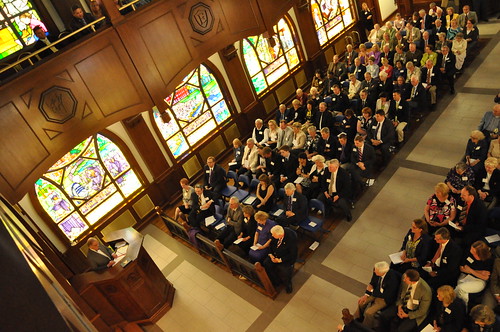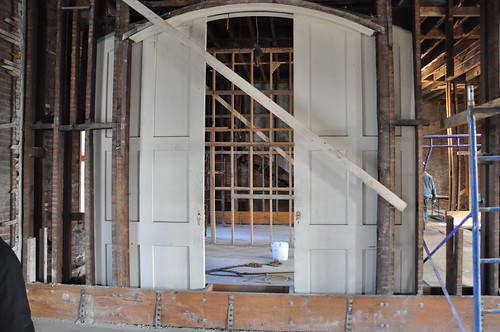
The Chapel has nearly reached completion. Just a few final touch-ups and some pews and she will be all set. We have already had our first official college event in the chapel and that was this year's President's Council Spring Reception. People were invited to see the new chapel as well as the parlor and center rotunda. Many were also taken aback by the stained glass windows that surround the room. Each window depicts either a college song, tradition, or historical event.
One of my favorite rooms in the newly renovated Cowles Hall is the parlor. What I like the most are the original french doors that were in the room when they were working on the first floor.

Originally, the parlors were specific rooms for the sororities on campus. There were two types of Greek letter societies. One was literary and the other were class sororities. They existed on campus for sixty-nine of the College's first hundred years, from 1865 to 1925.
The first society was Callisophia, organized in 1856 with Dr. Cowles as its sponsor. The second, Philomathea, was founded a decade later, in 1866, and was sponsored by Dr. Ford. Both were literary societies. Callisophia, whose Greek letters were Kappa Sigma, had a Latin motto: Per aspera ad astra (Translates to: "Through hardships to the stars"). Philomathea's Greek letters were Phi Mu, and it also had a Latin motto: Cor unum una via ( Translates to: "One heart, one way").
Each of these societies had a parlor in the west wing of the main hall. In these parlors, the societies assembled libraries, conducted meetings, and girded for public programs, which were called "exercises." These exercises went heavily into discussions of highly elevating nature and were well attended by the public. They were presented in a time before the auto, the movie, the radio and the cord were presenting materials to the masses.
 |
| image taken for the 1905 Iris yearbook |
In 1883, Callisophia and Philomathea dropped their old names in favor of their Greek letters, by which they were designated until they dissolved voluntarily on December 13, 1911. The parlors, so long sacred to Kappa Sigma and Phi Mu, were then opened to anyone who cared to enter.
The Class sororities date from 1905 and they existed for two decades. Delta Psi comprised the class of 1907 (juniors in the year of organization). Zeta Rho was for the sophomores and Epsilon Gamma was for the freshmen. The seniors had no sorority the first year. In the Fall of 1906, the new freshmen formed Delta Phi. Thus there was a sorority for each class.
These sororities remained active through the twenty years of their existence until what has been called their "sudden demise." The reasoning behind the dissolution appears to have been that a greater unity among the students might be achieved if the barriers of the societies ceases to exist. Kappa Sigma and Phi Mu were dissolved in 1911 for other reasons, which are detailed in the faculty minutes of 1911. The members submitted formal statements in which they expressed the feeling that their continued existence was detrimental to the best interest of the college.
The decision to disband the two old societies found opposition from many graduates. Older Alumnae, of the time, would return to campus and often pay sentimental visits to one of the parlors to recall the glad days as members of Kappa Sigma or Phi Mu.
Other early societies still exist today on campus such as Orchesis, a dance group and Sibyl, a literary society. Callisophia also stills exists on campus but as a student and staff annual journal published in co-operation between the gender issues group and the women's studies program.






